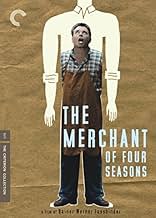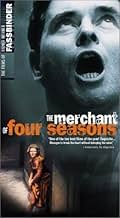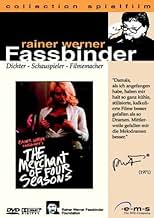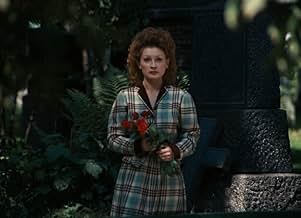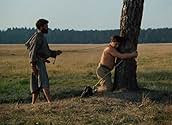IMDb-BEWERTUNG
7,3/10
5528
IHRE BEWERTUNG
Hans Epp ist ein selbstzerstörerischer Mann, der ein unzufriedenes Leben führt. Er versucht, als Obstverkäufer einen Sinn zu finden, aber ein Herzinfarkt behindert seine Arbeitsfähigkeit.Hans Epp ist ein selbstzerstörerischer Mann, der ein unzufriedenes Leben führt. Er versucht, als Obstverkäufer einen Sinn zu finden, aber ein Herzinfarkt behindert seine Arbeitsfähigkeit.Hans Epp ist ein selbstzerstörerischer Mann, der ein unzufriedenes Leben führt. Er versucht, als Obstverkäufer einen Sinn zu finden, aber ein Herzinfarkt behindert seine Arbeitsfähigkeit.
- Regie
- Drehbuch
- Hauptbesetzung
- Auszeichnungen
- 3 Gewinne & 5 Nominierungen insgesamt
Walter Sedlmayr
- Fruit cart salesman
- (as Walther Sedlmayer)
El Hedi ben Salem
- The Arab
- (as Salem El Heïdi)
Empfohlene Bewertungen
What kind I say about this movie. well for starters, I thought that this film was okay, not the greatest not worst. I said this cause I thought that the script was great and original, really different and refreshing. Now I wouldn't say that it's the greatest film that I've seeing cause of the acting. The actors that played each role, seems that they played them without emotions, as if they took the life out of them. When the wife laughed or cried, this didn't look real to me for some reason, that's just an example, but sincerely all the characters didn't act real at all. I wish I could say more positive things about this film so you guys can see it at least once but how can I do that since I know that I'm not going to see this movie again. I rented this film from the library of my school, without hearing anything about the film itself or the director. I took a chance because the story that was describe on the back sounded really interesting and it really was.
The Merchant of Four Seasons isn't what I would call a happy movie, at all, or even one that impressed me to the point of praising it to the sky (there are other Fassbinder flicks for that, like Veronika Voss and the underrated Satan's Brew). But it's certainly no less than a fascinating experiment in taking a look at those in a society that you and me and others we know might possibly know, or not really want to know. I imagine in the early 70s in Germany a generation, coming out of WW2, had a stigma to live with but tried their best just to get by. This is a stigma that floats all over this film, and in many instances in Fassbinder's work in general, but especially because with Four Seasons he takes his eye on the middle class, and a particular married couple- the distanced, depressed, angry Hans the fruit seller and his long-suffered wife- that is nothing short than trying for realism in the guise of melodrama. If Cassavetes were a crazy German he might make this film, maybe even as just a lark.
The story sounds simple enough, where Hans' drinking gets out of control, he beats his wife (this scene is one of the toughest to take, maybe in just any movie, the way Fassbinder's camera lingers without a cut as his wife is left helpless and their daughter trying to stop him in his frenzy) and then she's ready to leave him. As he stands in the room, her family holding him back, she makes the call for divorce and he gets a heart attack right there. He recovers, his business suddenly starts booming again with some help from some good (or not so good) employees - and yet this only continues his longing, for another woman, and his despair in general.
And yet it's in this simplicity that Fassbinder tries, and succeeds for the most part, in attaining a mood of dread, of a tense vibe in a kitchen or in the bedroom or out on the street that you can cut with a knife and bleed out. The weakest part of this all may be the acting... at least that was my initial impression. Hans, played by Hirschmuller, can be a stilted presence, with only the slightest movements in his face and eyes, and for a while it doesn't look like he's much of a good actor. The actress playing his wife, Irm Hermann, and her sister (Fassbinder Hanna Schygulla) fare better, but only cause they're given more to do conventionally, like cry or look concerned. It takes some time to adjust to what is, essentially, a void in his guy Hans, of something from his own psychological self-torment or self-pity that pervades himself and those around him who just want to get on with some sense of normalcy, especially once Hans gets successful.
Not everything clicks together in The Merchant of Four Seasons, but enough did to make me recommend it to those looking for a different slice-of-life than you might be used to with more modern American movies. Fassbinder's world here is a combat between the melodrama he loves in cinema and the harsh, crushing sense of humanism that he feels personally and puts into characters that, for better or worse, we somehow identify with. Are the Epps a family you know of? Or could you even be them? Who's to say. It's a methodical study of tragic emptiness in the human spirit, and its goals are all attained.
The story sounds simple enough, where Hans' drinking gets out of control, he beats his wife (this scene is one of the toughest to take, maybe in just any movie, the way Fassbinder's camera lingers without a cut as his wife is left helpless and their daughter trying to stop him in his frenzy) and then she's ready to leave him. As he stands in the room, her family holding him back, she makes the call for divorce and he gets a heart attack right there. He recovers, his business suddenly starts booming again with some help from some good (or not so good) employees - and yet this only continues his longing, for another woman, and his despair in general.
And yet it's in this simplicity that Fassbinder tries, and succeeds for the most part, in attaining a mood of dread, of a tense vibe in a kitchen or in the bedroom or out on the street that you can cut with a knife and bleed out. The weakest part of this all may be the acting... at least that was my initial impression. Hans, played by Hirschmuller, can be a stilted presence, with only the slightest movements in his face and eyes, and for a while it doesn't look like he's much of a good actor. The actress playing his wife, Irm Hermann, and her sister (Fassbinder Hanna Schygulla) fare better, but only cause they're given more to do conventionally, like cry or look concerned. It takes some time to adjust to what is, essentially, a void in his guy Hans, of something from his own psychological self-torment or self-pity that pervades himself and those around him who just want to get on with some sense of normalcy, especially once Hans gets successful.
Not everything clicks together in The Merchant of Four Seasons, but enough did to make me recommend it to those looking for a different slice-of-life than you might be used to with more modern American movies. Fassbinder's world here is a combat between the melodrama he loves in cinema and the harsh, crushing sense of humanism that he feels personally and puts into characters that, for better or worse, we somehow identify with. Are the Epps a family you know of? Or could you even be them? Who's to say. It's a methodical study of tragic emptiness in the human spirit, and its goals are all attained.
The Merchant of Four Seasons is a film about a lack of love. The film starts off with the main character; Hans Epp, returning from a spell in the foreign legion. He returns to his mother, not to be told how much she loves him, or how much she's missed him; but to be told that he is worthless and, even worse, that she would have preferred the man he went with to have come back instead. It is the character's relation to women that makes this film so hateful; the fact that his wife is taller than him is symbolic of his relation to the other gender; he is consistently humiliated by them, and it is through his relations with them that his life isn't as great as it could have been. This is also shown clearly by the way he treats his wife after a drink. He lost his job as a policeman through lust for a woman, and even his wife; a woman that is supposed to love him, never really shows any affection for him. Even at the end, his wife is more bothered about what her and her daughter will do than the state of her husband.
The Merchant of Four Seasons is a thoroughly unpleasant film. There isn't a scene in the movie where someone is happy, and not only that; but the movie seems deliriously blissful to wallow in the misery of it's central characters. The movie is certainly not recommended to anyone who is currently having a hard time, that's for sure. Despite all the misery, the film never steps out the bounds of reality; every event in this movie can - and most probably has - happened, and that only serves in making the movie more shocking. The film is, of course, helmed by Rainer Werner Fassbinder; the cult German director that committed suicide in 1982. This is only my second taste of the man's work, but through just two films, it is easy to get an idea of the type of art that he creates. Both films are downtrodden and gritty - yet realistic pieces of art. His characterization in this movie is subtle; we only ever get to know the characters through their plight's and not through their character. This is a very clever way of showing the audience that it is their surroundings that define the people in the film, not the people themselves - and as nearly everyone that sees the film knows what living in an urban society is like, it wont difficult for the majority of people to relate to.
The Merchant of Four Seasons is not a film that is easily forgettable; the movie is high on substance and low on style, and that makes for a very memorable picture, and one that everyone who considers themselves to be a fan of cinema should experience. It is with that in my mind that I give this film my highest recommendations; it's not sweet and it's not pleasant, but you will not see a more realistic portrayal of depression, and this is most certainly a movie that will stay with you.
The Merchant of Four Seasons is a thoroughly unpleasant film. There isn't a scene in the movie where someone is happy, and not only that; but the movie seems deliriously blissful to wallow in the misery of it's central characters. The movie is certainly not recommended to anyone who is currently having a hard time, that's for sure. Despite all the misery, the film never steps out the bounds of reality; every event in this movie can - and most probably has - happened, and that only serves in making the movie more shocking. The film is, of course, helmed by Rainer Werner Fassbinder; the cult German director that committed suicide in 1982. This is only my second taste of the man's work, but through just two films, it is easy to get an idea of the type of art that he creates. Both films are downtrodden and gritty - yet realistic pieces of art. His characterization in this movie is subtle; we only ever get to know the characters through their plight's and not through their character. This is a very clever way of showing the audience that it is their surroundings that define the people in the film, not the people themselves - and as nearly everyone that sees the film knows what living in an urban society is like, it wont difficult for the majority of people to relate to.
The Merchant of Four Seasons is not a film that is easily forgettable; the movie is high on substance and low on style, and that makes for a very memorable picture, and one that everyone who considers themselves to be a fan of cinema should experience. It is with that in my mind that I give this film my highest recommendations; it's not sweet and it's not pleasant, but you will not see a more realistic portrayal of depression, and this is most certainly a movie that will stay with you.
I didn't find this film as accessible as 'Fox & his Friends' but it was a moving portrayal of a typical Fassbinder victim figure, the eponymous barrow-boy, Hans Epp, whose hopes and dreams are eventually crushed by stultifying conformity (family & society). Some of the scenes are exaggerated (the family confrontations) but I particularly liked the sequence where Hans is desperately searching for meaning & comfort; he tries to find some peace in natural surroundings, goes back to his first lost love in order to recapture past feelings (she's only interested in a quick fling before her husband returns) and visits his sister, perhaps the only person who has any degree of sympathy for him, only to find she's too busy with work.
A poignant story of a vulnerable inarticulate man crushed by his mundane surroundings and bourgeoise, middle-class German values obsessed with economic success and a upward mobility that conveniently papers over the cracks of its more disturbing past.
A poignant story of a vulnerable inarticulate man crushed by his mundane surroundings and bourgeoise, middle-class German values obsessed with economic success and a upward mobility that conveniently papers over the cracks of its more disturbing past.
I rented the movie at the local library, since I had years earlier seen Angst Essen Die Seele Auf, and liked it. It started very interesting with Hans Epp returning from a spell with the Foreign Legion, but the first thing his mother told him was how he was a failure and always would be. "Was ist traurig VorMittag ist noch traurig NachMittag" But I found the actors in this movie to be like zombies. It might be that they just depicted a dreary every day life, but I felt midways into the film that I don`t need to have these pictures inside my head, so I pressed the stop button and in stead put on the other film I had rented at the library, an episode of Star Trek Voyager.
Not that this is a bad movie, it was just tragic to watch at the time.
Not that this is a bad movie, it was just tragic to watch at the time.
Wusstest du schon
- WissenswertesAndrea Schober's debut.
- VerbindungenFeatured in Sehnsucht nach Sodom (1989)
Top-Auswahl
Melde dich zum Bewerten an und greife auf die Watchlist für personalisierte Empfehlungen zu.
- How long is The Merchant of Four Seasons?Powered by Alexa
Details
Box Office
- Budget
- 325.000 DM (geschätzt)
- Bruttoertrag in den USA und Kanada
- 8.144 $
- Eröffnungswochenende in den USA und in Kanada
- 11.623 $
- 16. Feb. 2003
- Weltweiter Bruttoertrag
- 8.158 $
Zu dieser Seite beitragen
Bearbeitung vorschlagen oder fehlenden Inhalt hinzufügen

Oberste Lücke
By what name was Händler der vier Jahreszeiten (1972) officially released in India in English?
Antwort


